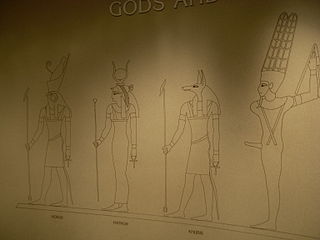Faith, derived from Latin fides and Old French feid, is confidence or trust in a person, thing, or concept. In the context of religion, one can define faith as "belief in God or in the doctrines or teachings of religion". According to Merriam-Webster's Dictionary, faith has multiple definitions, including "something that is believed especially with strong conviction," "complete trust," "belief and trust in and loyalty to God," as well as "a firm belief in something for which there is no proof".

Henotheism is the worship of a single, supreme god that does not deny the existence or possible existence of other deities. Friedrich Schelling (1775–1854) coined the word, and Friedrich Welcker (1784–1868) used it to depict primitive monotheism among ancient Greeks.

Theism is broadly defined as the belief in the existence of at least one deity. In common parlance, or when contrasted with deism, the term often describes the classical conception of God that is found in monotheism — or gods found in polytheistic religions — a belief in God or in gods without the rejection of revelation as is characteristic of deism. Gnosticism is the belief in personal spiritual knowledge.

Supernatural refers to phenomena or entities that are beyond the laws of nature. The term is derived from Medieval Latin supernaturalis, from Latin super- + natura (nature) Though the corollary term "nature", has had multiple meanings since the ancient world, the term "supernatural" emerged in the Middle Ages and did not exist in the ancient world.

Comparative religion is the branch of the study of religions with the systematic comparison of the doctrines and practices, themes and impacts of the world's religions. In general the comparative study of religion yields a deeper understanding of the fundamental philosophical concerns of religion such as ethics, metaphysics and the nature and forms of salvation. It also considers and compares the origins and similarities shared between the various religions of the world. Studying such material facilitates a broadened and more sophisticated understanding of human beliefs and practices regarding the sacred, numinous, spiritual and divine.

Richard Granville Swinburne is an English philosopher. He is an Emeritus Professor of Philosophy at the University of Oxford. Over the last 50 years Swinburne has been a proponent of philosophical arguments for the existence of God. His philosophical contributions are primarily in the philosophy of religion and philosophy of science. He aroused much discussion with his early work in the philosophy of religion, a trilogy of books consisting of The Coherence of Theism, The Existence of God, and Faith and Reason.

Christianity and other religions documents Christianity's relationship with other world religions, and the differences and similarities.
Nontheism or non-theism is a range of both religious and non-religious attitudes characterized by the absence of espoused belief in the existence of god or gods. Nontheism has generally been used to describe apathy or silence towards the subject of God and differs from atheism. Nontheism does not necessarily describe atheism or disbelief in God; it has been used as an umbrella term for summarizing various distinct and even mutually exclusive positions, such as agnosticism, ignosticism, ietsism, skepticism, pantheism, pandeism, transtheism, atheism, and apatheism. It is in use in the fields of Christian apologetics and general liberal theology.

In the field of comparative religion, many scholars, academics, and religious figures have looked at the relationships between Hinduism and other religions.

The Bampton Lectures at the University of Oxford, England, were founded by a bequest of John Bampton. They have taken place since 1780.

There were links between Buddhism and the pre-Christian Mediterranean world, with Buddhist missionaries sent by Emperor Ashoka of India to Syria, Egypt and Greece from 250 BC. Significant differences between the two religions include monotheism in Christianity and Buddhism's orientation towards nontheism which runs counter to teachings about God in Christianity, and grace in Christianity against the rejection of interference with karma in Theravada Buddhism on.

The term Urmonotheismus or "primitive monotheism" expresses the hypothesis of a monotheistic Urreligion, from which polytheistic religions allegedly degenerated. This evolutionary view of religious development contrasts diametrically with to another evolutionary view on the development of religious thought: the hypothesis that religion progressed from simple forms to complex: first pre-animism, then animism, totemism, polytheism, and finally monotheism.

Buddhism was known in the pre-Christian Greek world through the campaigns of Alexander the Great, and several prominent early Christian fathers, including Clement of Alexandria and St. Jerome, were aware of the Buddha, even mentioning him in their works. However, the majority of modern scholars who have studied both Buddhism and Christianity hold that there is no direct historical evidence of any influence by Buddhism on early Christianity. Scholars generally consider any such influence implausible given that first century Jews are highly unlikely to have been open to far eastern concepts that appeared opposed to some of their basic beliefs.
Atheism, in the broadest sense, is an absence of belief in the existence of deities. Less broadly, atheism is a rejection of the belief that any deities exist. In an even narrower sense, atheism is specifically the position that there are no deities. Atheism is contrasted with theism, which in its most general form is the belief that at least one deity exists.
In the philosophy of religion and theology, post-monotheism is a term covering a range of different meanings that nonetheless share concern for the status of faith and religious experience in the modern or post-modern era. There is no one originator for the term. Rather, it has independently appeared in the writings of several intellectuals on the Internet and in print. Its most notable use has been in the poetry of Arab Israeli author Nidaa Khoury, and as a label for a "new sensibility" or theological approach proposed by the Islamic historian Christopher Schwartz.

Polytheism is the belief in multiple deities, which are usually assembled into a pantheon of gods and goddesses, along with their own religious sects and rituals. Polytheism is a type of theism. Within theism, it contrasts with monotheism, the belief in a singular God who is, in most cases, transcendent. In religions that accept polytheism, the different gods and goddesses may be representations of forces of nature or ancestral principles; they can be viewed either as autonomous or as aspects or emanations of a creator deity or transcendental absolute principle, which manifests immanently in nature. Polytheists do not always worship all the gods equally; they can be henotheists, specializing in the worship of one particular deity, or kathenotheists, worshiping different deities at different times.
This is a list of articles in philosophy of religion.

Mysticism is popularly known as becoming one with God or the Absolute, but may refer to any kind of ecstasy or altered state of consciousness which is given a religious or spiritual meaning. It may also refer to the attainment of insight in ultimate or hidden truths, and to human transformation supported by various practices and experiences.

George Dawes Hicks FBA was a British philosopher who was the first professor of moral philosophy at University College, London from 1904 until 1928 and professor emeritus thereafter until his death.

Since the arrival of Christian missionaries in India in the 1st century, followed by the arrival of Buddhism in Western Europe in the 4th and 5th centuries, similarities have been perceived between the practices of Buddhism and Christianity. During the 20th century, the differences between these two belief systems were also highlighted.